-
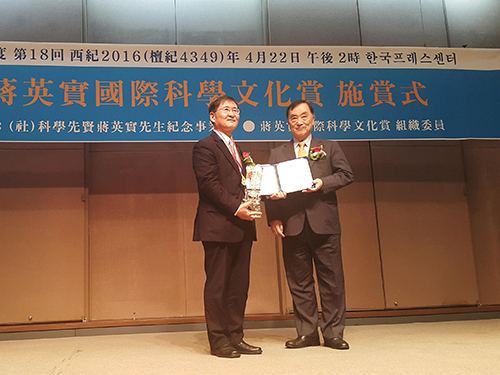 President Sung-Mo Kang Receives the Jang Young-sil Award
On April 22, 2016, President Sung-Mo Kang of KAIST became the 18th recipient of the Jang Young-sil Award. The Jang Young-sil Memorial Association of Korea awarded the prize to him at the Korea Press Center in Seoul.
The award, created in 1999 by the Jang Young-sil Memorial Association of Korea to recognize those scientists who have made significant contributions to the development of Korean science and technology, is bestowed annually.
Jang Young-sil was a highly regarded Korean scientist and astronomer during the Joseon Dynasty (1392-1897), whose major inventions were a sundial, a water clock, and a rain gauge.
In the award ceremony, the association said that President Kang had devoted much of his life to the advancement of science education and research, globally and nationally, as an educator, scholar, administrator, and researcher and that his accomplishments have served as an example of leadership for young scientists.
In his acceptance speech, President Kang expressed his gratitude for the award and said,
“I am honored to receive an award in the name of our great ancestor scientist Jang Young-sil who, despite his low birth as a peasant, rose to become an excellent scientist and built a remarkable legacy of science for Korea. While cherishing his spirit, creativity and grit, I will continue to working hard to foster outstanding scientists and engineers who are needed not only by Korea but also by the global community.”
In the photo, Dr. Gun-Mo Chung (pictured on the right), the former Minister of Science and Technology of Korea presents the Jang Young-sil Award to President Sung-Mo Kang (left).
2016.04.22 View 6069
President Sung-Mo Kang Receives the Jang Young-sil Award
On April 22, 2016, President Sung-Mo Kang of KAIST became the 18th recipient of the Jang Young-sil Award. The Jang Young-sil Memorial Association of Korea awarded the prize to him at the Korea Press Center in Seoul.
The award, created in 1999 by the Jang Young-sil Memorial Association of Korea to recognize those scientists who have made significant contributions to the development of Korean science and technology, is bestowed annually.
Jang Young-sil was a highly regarded Korean scientist and astronomer during the Joseon Dynasty (1392-1897), whose major inventions were a sundial, a water clock, and a rain gauge.
In the award ceremony, the association said that President Kang had devoted much of his life to the advancement of science education and research, globally and nationally, as an educator, scholar, administrator, and researcher and that his accomplishments have served as an example of leadership for young scientists.
In his acceptance speech, President Kang expressed his gratitude for the award and said,
“I am honored to receive an award in the name of our great ancestor scientist Jang Young-sil who, despite his low birth as a peasant, rose to become an excellent scientist and built a remarkable legacy of science for Korea. While cherishing his spirit, creativity and grit, I will continue to working hard to foster outstanding scientists and engineers who are needed not only by Korea but also by the global community.”
In the photo, Dr. Gun-Mo Chung (pictured on the right), the former Minister of Science and Technology of Korea presents the Jang Young-sil Award to President Sung-Mo Kang (left).
2016.04.22 View 6069 -
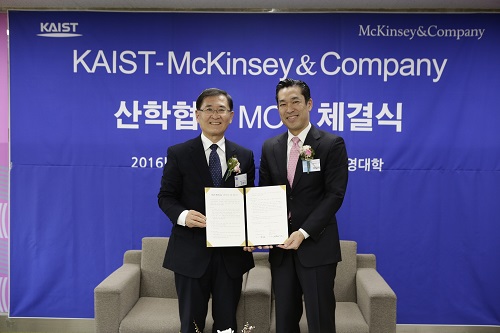 KAIST and McKinsey Korea Agreed to Cultivate Management Leaders
KAIST and McKinsey Korea signed a memorandum of understanding (MOU) for the “Joint Research on Innovative Instructional Method to Cultivate Future Management Leaders” on April 8, 2016, at the SUPEX Management Hall of KAIST Management School in Seoul.
Under the MOU, both organizations will cooperate in the following research areas: management strategies to overcome the low growth of Korean economy, instructional methods to foster leaders in the field of business and management, and innovative management systems for business.
President Kang said, “We are pleased to work with McKinsey, a worldwide management consulting firm, to foster leaders in science and business. As we see more demanding challenges of managing and leading science-based businesses today, this alliance is indeed timely and will be very helpful.”
2016.04.15 View 6357
KAIST and McKinsey Korea Agreed to Cultivate Management Leaders
KAIST and McKinsey Korea signed a memorandum of understanding (MOU) for the “Joint Research on Innovative Instructional Method to Cultivate Future Management Leaders” on April 8, 2016, at the SUPEX Management Hall of KAIST Management School in Seoul.
Under the MOU, both organizations will cooperate in the following research areas: management strategies to overcome the low growth of Korean economy, instructional methods to foster leaders in the field of business and management, and innovative management systems for business.
President Kang said, “We are pleased to work with McKinsey, a worldwide management consulting firm, to foster leaders in science and business. As we see more demanding challenges of managing and leading science-based businesses today, this alliance is indeed timely and will be very helpful.”
2016.04.15 View 6357 -
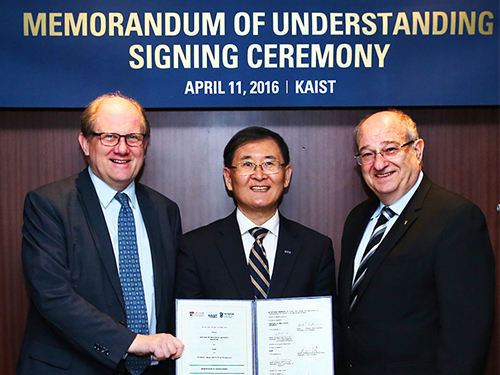 KAIST, NTU, and Technion Collaborate for Research in Emerging Fields
KAIST, Nanyang Technological University (NTU) of Singapore, and Technion of Israel signed an agreement on April 11, 2016 in Seoul to create a five-year joint research program for some of the most innovative and entrepreneurial areas: robotics, medical technologies, satellites, materials science and engineering, and entrepreneurship. Under the agreement, the universities will also offer dual degree opportunities, exchange visits, and internships.
In the picture from the left, Bertil Andersson of NTU, Sung-Mo Kang of KAIST, and Peretz Lavie of Technion hold the signed memorandum of understanding.
2016.04.14 View 13192
KAIST, NTU, and Technion Collaborate for Research in Emerging Fields
KAIST, Nanyang Technological University (NTU) of Singapore, and Technion of Israel signed an agreement on April 11, 2016 in Seoul to create a five-year joint research program for some of the most innovative and entrepreneurial areas: robotics, medical technologies, satellites, materials science and engineering, and entrepreneurship. Under the agreement, the universities will also offer dual degree opportunities, exchange visits, and internships.
In the picture from the left, Bertil Andersson of NTU, Sung-Mo Kang of KAIST, and Peretz Lavie of Technion hold the signed memorandum of understanding.
2016.04.14 View 13192 -
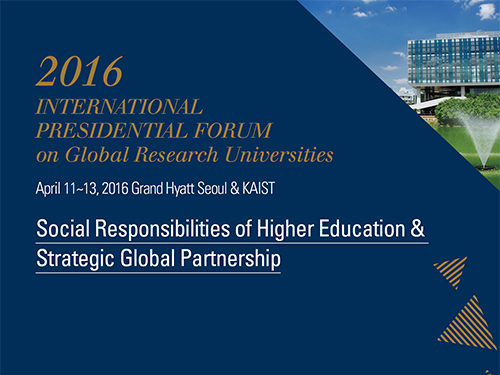 KAIST Hosts the 2016 IPFGRU
More than 120 senior representatives from 65 universities around the world will convene this month in Seoul to discuss the social responsibilities of higher education and strategic global partnerships among academia, research, and industry to advance socio-economic values.
Higher education as a driver of change to address the social and global challenges facing humanity in the 21st century has never been as important as it is today.
KAIST will raise the topic of higher education as a driver of social change, innovation, and entrepreneurship with the heads of global universities at its seventh international forum to be held on April 11-12, 2016 at the Grand Hyatt Hotel in Seoul, the Republic of Korea.
The 2016 International Presidential Forum on Global Research Universities (IPFGRU) will bring over 120 presidents and vice presidents of 65 research universities and institutes from 36 nations together to discuss the theme of “Social Responsibilities of Higher Education and Strategic Global Partnership.”
Presidents Sung-Mo Kang of KAIST, Jacques Biot of École Polytechnique in France, and Peretz Lavie of the Technion-Israel Institute of Technology will address the conference as plenary speakers.
President Kang will speak about KAIST’s initiatives to produce creative talents through student-centered education, entrepreneurship curricula, and the integration of humanities into cutting-edge research programs. His presentation, titled “The Fostering of Creative Talents and the Social Responsibility of Research Universities in the New Era,” introduces KAIST’s educational philosophy which can be represented as π. A broad range of understanding in basic disciplines (the horizontal line) is supported with one prong of in-depth knowledge in a chosen field and the other in entrepreneurial spirit.
KAIST graduates have demonstrated extraordinary leadership in research, academia, business, and public service. Nearly 25% of the research and development personnel at Samsung Electronics are KAIST Ph.D. holders. President Kang also describes KAIST’s latest endeavor to turn a university-led entrepreneurial activity into a stable business based on research outcomes and campus innovations. The K-School, a one-year master’s degree program on entrepreneurship and innovation, has just launched and is expecting to receive its first batch of students this fall. The K-School is envisioned to continue the university’s legacy as a major feeder for startups in Korea.
President Lavie will give a talk on “Fostering an Innovation and Entrepreneurship (I&E) Ecosystem in Israel,” in which he describes how the Technion-Israel Institute has become integral to the foundation of the nation’s I&E platform. Since its establishment in 1912, the university has become a key player in the growth of Israel’s industry, science, and technology while nurturing the majority of the nation’s top-notch researchers, innovators, and entrepreneurs. Technion graduates have created more than 2,000 companies in Israel alone, generating 100,000 jobs and USD 30 billion through mergers and acquisitions.
President Biot will offer his insights into how the future of global research universities will be widely impacted by the emergence of disruptions triggered by the Fourth Industrial Revolution. In his speech entitled “How to Prepare Our Universities for the New Era of Industry 4.0,” he emphasizes that universities should take multi-disciplinary approaches to tackle societal challenges given the complexity of today’s problems ranging from climate change to energy crises, pandemic diseases, and poverty. He argues that universities should identify the needs of students in “Generation Z” who, from birth, have been heavily exposed to the Internet and digital technologies and, thus, universities should develop new educational systems (i.e., University 4.0.) to better prepare these students to cope with Industry 4.0.
The IPFGRU consists of presentations and discussions addressing the following sub-topics:
- Seeking a New Model of Research Universities in a New Era: This session will explore the role of research universities as both innovation drivers and growth engines in an age of robotics, globalization, and digitally-driven markets. In addition, speakers will discuss how to prepare universities for the Industry 4.0 era, and how multidisciplinary approaches and open innovations will play a large part in facilitating translational research and technology transfer.
- Shared Challenges and Responsibilities from a Global Perspective: Universities will share their strategies, policies, and practices to respond to critical issues facing local and global communities such as youth unemployment, the environment, energy, inequality, and entrepreneurship.
- Strategic Global Partnerships for Sustainable Development: Panelists will discuss how to build productive and sustainable partnerships that can generate synergies between education and research.
- Insights into Higher Education: Trends and Development: Participants will examine how universities can stay relevant in an increasingly competitive higher education sector and can assist students to better adapt to opportunities and challenges posed by the new industry of digital transformation and exponentially-growing technologies.
Sung-Hyon Myaeng, the Associate Vice President of the International Office at KAIST and a Co-chair of the 2016 IPFGRU said,
“The IPFGRU was established in 2008 to promote excellence and innovation in higher education with presidents of leading research universities and key policy-makers in the private and public sectors from across the world. Since then, it has served as one of the largest university gatherings in Asia, allowing participants to cooperate and share their expertise, ideas, and best practices taking place in academia, industry, and government.”
“This year’s meeting has recorded the largest number of universities participating, including 28 European schools, 20 Asian institutions, and 8 schools from the Americas, which I believe reflects a sense of urgency that global universities share. One way or another, we must adapt to the rapidly transforming educational and research environment encompassing higher learning,” added Myaeng.
For more information, go to http://forum.kaist.ac.kr.
2016.04.08 View 10050
KAIST Hosts the 2016 IPFGRU
More than 120 senior representatives from 65 universities around the world will convene this month in Seoul to discuss the social responsibilities of higher education and strategic global partnerships among academia, research, and industry to advance socio-economic values.
Higher education as a driver of change to address the social and global challenges facing humanity in the 21st century has never been as important as it is today.
KAIST will raise the topic of higher education as a driver of social change, innovation, and entrepreneurship with the heads of global universities at its seventh international forum to be held on April 11-12, 2016 at the Grand Hyatt Hotel in Seoul, the Republic of Korea.
The 2016 International Presidential Forum on Global Research Universities (IPFGRU) will bring over 120 presidents and vice presidents of 65 research universities and institutes from 36 nations together to discuss the theme of “Social Responsibilities of Higher Education and Strategic Global Partnership.”
Presidents Sung-Mo Kang of KAIST, Jacques Biot of École Polytechnique in France, and Peretz Lavie of the Technion-Israel Institute of Technology will address the conference as plenary speakers.
President Kang will speak about KAIST’s initiatives to produce creative talents through student-centered education, entrepreneurship curricula, and the integration of humanities into cutting-edge research programs. His presentation, titled “The Fostering of Creative Talents and the Social Responsibility of Research Universities in the New Era,” introduces KAIST’s educational philosophy which can be represented as π. A broad range of understanding in basic disciplines (the horizontal line) is supported with one prong of in-depth knowledge in a chosen field and the other in entrepreneurial spirit.
KAIST graduates have demonstrated extraordinary leadership in research, academia, business, and public service. Nearly 25% of the research and development personnel at Samsung Electronics are KAIST Ph.D. holders. President Kang also describes KAIST’s latest endeavor to turn a university-led entrepreneurial activity into a stable business based on research outcomes and campus innovations. The K-School, a one-year master’s degree program on entrepreneurship and innovation, has just launched and is expecting to receive its first batch of students this fall. The K-School is envisioned to continue the university’s legacy as a major feeder for startups in Korea.
President Lavie will give a talk on “Fostering an Innovation and Entrepreneurship (I&E) Ecosystem in Israel,” in which he describes how the Technion-Israel Institute has become integral to the foundation of the nation’s I&E platform. Since its establishment in 1912, the university has become a key player in the growth of Israel’s industry, science, and technology while nurturing the majority of the nation’s top-notch researchers, innovators, and entrepreneurs. Technion graduates have created more than 2,000 companies in Israel alone, generating 100,000 jobs and USD 30 billion through mergers and acquisitions.
President Biot will offer his insights into how the future of global research universities will be widely impacted by the emergence of disruptions triggered by the Fourth Industrial Revolution. In his speech entitled “How to Prepare Our Universities for the New Era of Industry 4.0,” he emphasizes that universities should take multi-disciplinary approaches to tackle societal challenges given the complexity of today’s problems ranging from climate change to energy crises, pandemic diseases, and poverty. He argues that universities should identify the needs of students in “Generation Z” who, from birth, have been heavily exposed to the Internet and digital technologies and, thus, universities should develop new educational systems (i.e., University 4.0.) to better prepare these students to cope with Industry 4.0.
The IPFGRU consists of presentations and discussions addressing the following sub-topics:
- Seeking a New Model of Research Universities in a New Era: This session will explore the role of research universities as both innovation drivers and growth engines in an age of robotics, globalization, and digitally-driven markets. In addition, speakers will discuss how to prepare universities for the Industry 4.0 era, and how multidisciplinary approaches and open innovations will play a large part in facilitating translational research and technology transfer.
- Shared Challenges and Responsibilities from a Global Perspective: Universities will share their strategies, policies, and practices to respond to critical issues facing local and global communities such as youth unemployment, the environment, energy, inequality, and entrepreneurship.
- Strategic Global Partnerships for Sustainable Development: Panelists will discuss how to build productive and sustainable partnerships that can generate synergies between education and research.
- Insights into Higher Education: Trends and Development: Participants will examine how universities can stay relevant in an increasingly competitive higher education sector and can assist students to better adapt to opportunities and challenges posed by the new industry of digital transformation and exponentially-growing technologies.
Sung-Hyon Myaeng, the Associate Vice President of the International Office at KAIST and a Co-chair of the 2016 IPFGRU said,
“The IPFGRU was established in 2008 to promote excellence and innovation in higher education with presidents of leading research universities and key policy-makers in the private and public sectors from across the world. Since then, it has served as one of the largest university gatherings in Asia, allowing participants to cooperate and share their expertise, ideas, and best practices taking place in academia, industry, and government.”
“This year’s meeting has recorded the largest number of universities participating, including 28 European schools, 20 Asian institutions, and 8 schools from the Americas, which I believe reflects a sense of urgency that global universities share. One way or another, we must adapt to the rapidly transforming educational and research environment encompassing higher learning,” added Myaeng.
For more information, go to http://forum.kaist.ac.kr.
2016.04.08 View 10050 -
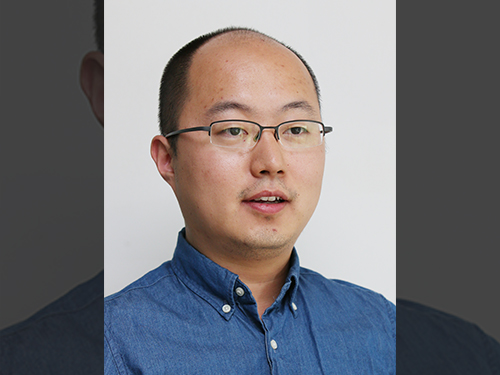 Next-Generation Holographic Microscope for 3D Live Cell Imaging
KAIST researchers have developed a revolutionary bio-medical imaging tool, the HT-1, to view and analyze cells, which is commercially available.
Professor YongKeun Park of the Physics Department at KAIST and his research team have developed a powerful method for 3D imaging of live cells without staining. The researchers announced the launch of their new microscopic tool, the holotomography (HT)-1, to the global marketplace through a Korean start-up that Professor Park co-founded, TomoCube (www.tomocube.com).
Professor Park is a leading researcher in the field of biophotonics and has dedicated much of his research career to working on digital holographic microscopy technology. He collaborated with TomoCube’s R&D team to develop a state-of-the-art, 2D/3D/4D holographic microscope that would allow a real-time label-free visualization of biological cells and tissues.
The HT is an optical analogy of X-ray computed tomography (CT). Both X-ray CT and HT share the same physical principle—the inverse of wave scattering. The difference is that HT uses laser illumination whereas X-ray CT uses X-ray beams. From the measurement of multiple 2D holograms of a cell, coupled with various angles of laser illuminations, the 3D refractive index (RI) distribution of the cell can be reconstructed. The reconstructed 3D RI map provides structural and chemical information of the cell including mass, morphology, protein concentration, and dynamics of the cellular membrane.
The HT enables users to quantitatively and non-invasively investigate the intrinsic properties of biological cells, for example, dry mass and protein concentration. Some of the research team’s breakthroughs that have leveraged HT’s unique and special capabilities can be found in several recent publications, including a lead article on the simultaneous 3D visualization and position tracking of optically trapped particles which was published in Optica on April 20, 2015.
Current fluorescence confocal microscopy techniques require the use of exogenous labeling agents to render high-contrast molecular information. Therefore, drawbacks include possible photo-bleaching, photo-toxicity, and interference with normal molecular activities. Immune or stem cells that need to be reinjected into the body are considered particularly difficult to employ with fluorescence microscopy.
“As one of the two currently available, high-resolution tomographic microscopes in the world, I believe that the HT-1 is the best in class regarding specifications and functionality. Users can see 3D/4D live images of cells, without fixing, coating or staining cells. Sample preparation times are reduced from a few days or hours to just a few minutes,” said Professor Park.
Two Korean hospitals, Seoul National University Hospital in Bundang and Boramae Hospital in Seoul, are using this microscope currently. The research team has also introduced the HT-1 at the Photonics West Exhibition 2016 that took place on February 16-18 in San Francisco, USA.
Professor Park added, “Our technology has set a new paradigm for cell observation under a microscope. I expect that this tomographic microscopy will be more widely used in future in various areas of pharmaceuticals, neuroscience, immunology, hematology, and cell biology.”
Figure 1: HT-1 and Its Specifications
Figure 2: 3D Images of Representative Biological Cells Taken with the HT-1
2016.03.29 View 13835
Next-Generation Holographic Microscope for 3D Live Cell Imaging
KAIST researchers have developed a revolutionary bio-medical imaging tool, the HT-1, to view and analyze cells, which is commercially available.
Professor YongKeun Park of the Physics Department at KAIST and his research team have developed a powerful method for 3D imaging of live cells without staining. The researchers announced the launch of their new microscopic tool, the holotomography (HT)-1, to the global marketplace through a Korean start-up that Professor Park co-founded, TomoCube (www.tomocube.com).
Professor Park is a leading researcher in the field of biophotonics and has dedicated much of his research career to working on digital holographic microscopy technology. He collaborated with TomoCube’s R&D team to develop a state-of-the-art, 2D/3D/4D holographic microscope that would allow a real-time label-free visualization of biological cells and tissues.
The HT is an optical analogy of X-ray computed tomography (CT). Both X-ray CT and HT share the same physical principle—the inverse of wave scattering. The difference is that HT uses laser illumination whereas X-ray CT uses X-ray beams. From the measurement of multiple 2D holograms of a cell, coupled with various angles of laser illuminations, the 3D refractive index (RI) distribution of the cell can be reconstructed. The reconstructed 3D RI map provides structural and chemical information of the cell including mass, morphology, protein concentration, and dynamics of the cellular membrane.
The HT enables users to quantitatively and non-invasively investigate the intrinsic properties of biological cells, for example, dry mass and protein concentration. Some of the research team’s breakthroughs that have leveraged HT’s unique and special capabilities can be found in several recent publications, including a lead article on the simultaneous 3D visualization and position tracking of optically trapped particles which was published in Optica on April 20, 2015.
Current fluorescence confocal microscopy techniques require the use of exogenous labeling agents to render high-contrast molecular information. Therefore, drawbacks include possible photo-bleaching, photo-toxicity, and interference with normal molecular activities. Immune or stem cells that need to be reinjected into the body are considered particularly difficult to employ with fluorescence microscopy.
“As one of the two currently available, high-resolution tomographic microscopes in the world, I believe that the HT-1 is the best in class regarding specifications and functionality. Users can see 3D/4D live images of cells, without fixing, coating or staining cells. Sample preparation times are reduced from a few days or hours to just a few minutes,” said Professor Park.
Two Korean hospitals, Seoul National University Hospital in Bundang and Boramae Hospital in Seoul, are using this microscope currently. The research team has also introduced the HT-1 at the Photonics West Exhibition 2016 that took place on February 16-18 in San Francisco, USA.
Professor Park added, “Our technology has set a new paradigm for cell observation under a microscope. I expect that this tomographic microscopy will be more widely used in future in various areas of pharmaceuticals, neuroscience, immunology, hematology, and cell biology.”
Figure 1: HT-1 and Its Specifications
Figure 2: 3D Images of Representative Biological Cells Taken with the HT-1
2016.03.29 View 13835 -
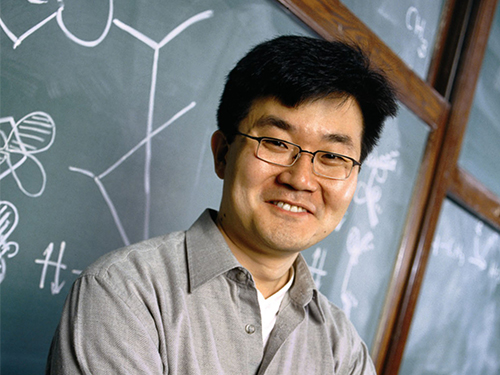 Efficient Methane C-H Bond Activated by KAIST and UPenn Teams
Professor Mu-Hyun Baik of the Chemistry Department at KAIST and his team collaborated with an international team to discover a novel chemical reaction, carbon-hydrogen borylation using methane, and their research results were published in the March 25th issue of Science.
For details, please refer to the following press release from the Institute for Basic Sciences (IBS) in Korea and the University of Pennsylvania in the United States.
Efficient Methane C-H Bond Activation Achieved for the First Time
The Institute for Basic Science, March 24, 2016
Penn Chemists Lay Groundwork for Countless New, Cleaner Uses of Methane
University of Pennsylvania, March 24, 2016
2016.03.25 View 10472
Efficient Methane C-H Bond Activated by KAIST and UPenn Teams
Professor Mu-Hyun Baik of the Chemistry Department at KAIST and his team collaborated with an international team to discover a novel chemical reaction, carbon-hydrogen borylation using methane, and their research results were published in the March 25th issue of Science.
For details, please refer to the following press release from the Institute for Basic Sciences (IBS) in Korea and the University of Pennsylvania in the United States.
Efficient Methane C-H Bond Activation Achieved for the First Time
The Institute for Basic Science, March 24, 2016
Penn Chemists Lay Groundwork for Countless New, Cleaner Uses of Methane
University of Pennsylvania, March 24, 2016
2016.03.25 View 10472 -
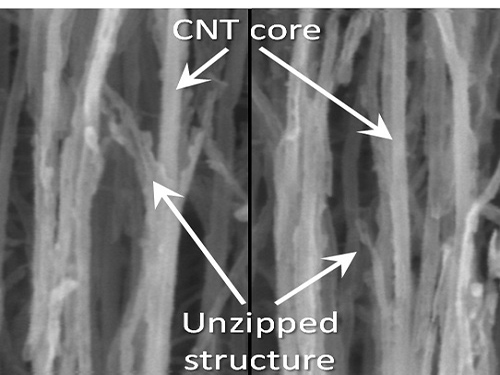 KAIST Team Develops Technology to Enable Unzipping of the Graphene Plane
Professor Sang-Wook Kim’s research team of the Material Science and Engineering Department has developed a technique, which enables unzipping of the graphene plane without uncontrollable damage. The research findings were published online on the January 22 issue of Nature Communications.
Graphene is a form of carbon in which its atoms form a honey-comb structure through chemical bonding. If this structure can be cut to a desired form, other carbon materials with nanostructure can be created. Many researchers have tried to obtain the accurate unzipping of graphene structures, but faced challenges doing so.
To break a very strong bond between carbon atoms, an equivalently strong chemical reaction must be induced. But the chemical reaction not only cuts out the desirable borders, but also damages the surrounding ones. Conventional techniques, which cut out graphene at once, damaged the chemical properties of the graphene structure after unzipping. This is similar to wearing out paper while manipulating it.
To solve this problem, the research team adopted “heteroatom doping.” The idea is similar to a sheet of paper being split following a groove drawn on the sheet. After making some regions of the structure unstable by doping other atoms such as nitrogen on a carbon plane, the regions are electrochemically stimulated to split the parts. Nitrogen or other atoms act as the groove on the grapheme plane.
The researchers finely controlled the amount of unzipping graphene by adjusting the amount of heteroatom dopants, from which they were able to create a quality nano graphene without any damage in its 2-dimensional crystalline structure. Using this technique, the researchers were able to obtain a capacitor with state-of-the-art energy transfer speed. The nano graphene can be combined with polymer, metal, and semiconductor nano molecules to form carbon composites.
Professor Kim said, “In order to commercialize this technique, heteroatom doping should be researched further. We plan to develop fabric-like carbon materials with excellent mechanical and electrical properties using this technique.”
Picture 1: Unzipped Carbon Nano Tube
Picture 2: Development of Nano Graphene from Carbon Nano Tube Using Heteroatom Dopants
Korean descriptions translated into English:
Unzipping Process of Graphene
Carbon Nano Tube → Nano Graphen
Heteroatom
This process is similar to a paper being split in two from a tiny hole punched therein.
2016.03.22 View 9608
KAIST Team Develops Technology to Enable Unzipping of the Graphene Plane
Professor Sang-Wook Kim’s research team of the Material Science and Engineering Department has developed a technique, which enables unzipping of the graphene plane without uncontrollable damage. The research findings were published online on the January 22 issue of Nature Communications.
Graphene is a form of carbon in which its atoms form a honey-comb structure through chemical bonding. If this structure can be cut to a desired form, other carbon materials with nanostructure can be created. Many researchers have tried to obtain the accurate unzipping of graphene structures, but faced challenges doing so.
To break a very strong bond between carbon atoms, an equivalently strong chemical reaction must be induced. But the chemical reaction not only cuts out the desirable borders, but also damages the surrounding ones. Conventional techniques, which cut out graphene at once, damaged the chemical properties of the graphene structure after unzipping. This is similar to wearing out paper while manipulating it.
To solve this problem, the research team adopted “heteroatom doping.” The idea is similar to a sheet of paper being split following a groove drawn on the sheet. After making some regions of the structure unstable by doping other atoms such as nitrogen on a carbon plane, the regions are electrochemically stimulated to split the parts. Nitrogen or other atoms act as the groove on the grapheme plane.
The researchers finely controlled the amount of unzipping graphene by adjusting the amount of heteroatom dopants, from which they were able to create a quality nano graphene without any damage in its 2-dimensional crystalline structure. Using this technique, the researchers were able to obtain a capacitor with state-of-the-art energy transfer speed. The nano graphene can be combined with polymer, metal, and semiconductor nano molecules to form carbon composites.
Professor Kim said, “In order to commercialize this technique, heteroatom doping should be researched further. We plan to develop fabric-like carbon materials with excellent mechanical and electrical properties using this technique.”
Picture 1: Unzipped Carbon Nano Tube
Picture 2: Development of Nano Graphene from Carbon Nano Tube Using Heteroatom Dopants
Korean descriptions translated into English:
Unzipping Process of Graphene
Carbon Nano Tube → Nano Graphen
Heteroatom
This process is similar to a paper being split in two from a tiny hole punched therein.
2016.03.22 View 9608 -
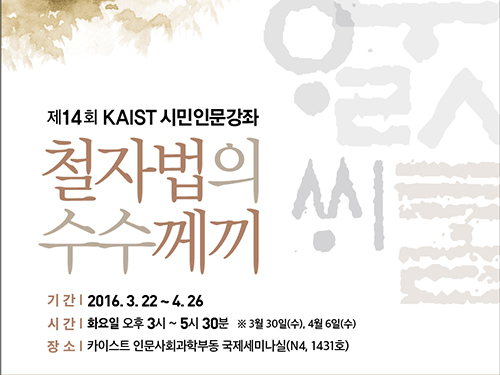 Public Lectures on the Korean Language and Alphabet
The School of Humanities and Social Sciences at KAIST will offer public lectures on the Korean language and alphabet, Hangul, from March 22, 2016 to April 26, 2016.
The lectures, which are entitled “The Riddle of Hangul,” will take place on campus in Daejeon.
A total of six lectures will be held on such topics as the origin of Korean, the grammar of ancient Korean in the Chosun Dynasty (1392-1897), and subsequent developments in contemporary Korean.
Professor Jung-Hoon Kim, who is responsible for organizing the public lecture program, said, “The audience will have an interesting opportunity to understand the history of Korean and its mechanism, while reviewing the unique spelling system of Hangul. I hope many people will show up for these wonderful classes.”
For further information and registration, please visit: http://hss.kaist.ac.kr. All lectures, available only in Korean, are free and open to the public.
2016.03.15 View 9896
Public Lectures on the Korean Language and Alphabet
The School of Humanities and Social Sciences at KAIST will offer public lectures on the Korean language and alphabet, Hangul, from March 22, 2016 to April 26, 2016.
The lectures, which are entitled “The Riddle of Hangul,” will take place on campus in Daejeon.
A total of six lectures will be held on such topics as the origin of Korean, the grammar of ancient Korean in the Chosun Dynasty (1392-1897), and subsequent developments in contemporary Korean.
Professor Jung-Hoon Kim, who is responsible for organizing the public lecture program, said, “The audience will have an interesting opportunity to understand the history of Korean and its mechanism, while reviewing the unique spelling system of Hangul. I hope many people will show up for these wonderful classes.”
For further information and registration, please visit: http://hss.kaist.ac.kr. All lectures, available only in Korean, are free and open to the public.
2016.03.15 View 9896 -
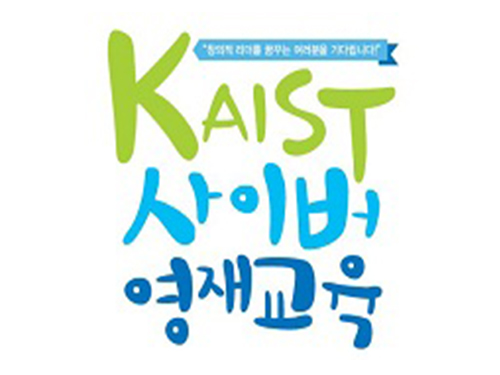 KAIST Offers Online Science Magnet High School Program
The Global Institute for Talented Education at KAIST has begun providing middle and high school students with in-depth online science education.
The institute receives applications until March 20, 2016. For details, please refer to the website: http://talented.kaist.ac.kr.
The program will run from March 21, 2016 to June 13, 2016.
Any middle and high school student can take courses on mathematics, science (physics, chemistry and biology), and information system (C language and Python computer language) based on their levels and needs. A total of 23 courses will be offered at the level of the first year of middle school to the second year of high school.
The online lecturers are drawn from science-magnet high schools nationwide. They will lead the classes to become more interactive with students, encouraging discussions and questions and answers.
KAIST students will also take part as tutors, helping the middle and high school students better understand the basic concept of the subjects they undertake and and to think creatively to solve problems.
About 500 top students will be chosen from the online course applicants to participate in a science camp hosted by KAIST during summer and winter vacations.
2016.03.14 View 5541
KAIST Offers Online Science Magnet High School Program
The Global Institute for Talented Education at KAIST has begun providing middle and high school students with in-depth online science education.
The institute receives applications until March 20, 2016. For details, please refer to the website: http://talented.kaist.ac.kr.
The program will run from March 21, 2016 to June 13, 2016.
Any middle and high school student can take courses on mathematics, science (physics, chemistry and biology), and information system (C language and Python computer language) based on their levels and needs. A total of 23 courses will be offered at the level of the first year of middle school to the second year of high school.
The online lecturers are drawn from science-magnet high schools nationwide. They will lead the classes to become more interactive with students, encouraging discussions and questions and answers.
KAIST students will also take part as tutors, helping the middle and high school students better understand the basic concept of the subjects they undertake and and to think creatively to solve problems.
About 500 top students will be chosen from the online course applicants to participate in a science camp hosted by KAIST during summer and winter vacations.
2016.03.14 View 5541 -
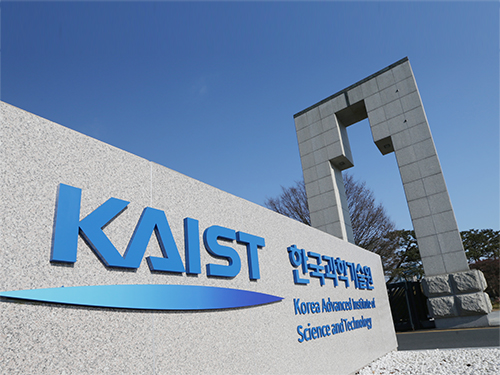 KAIST Identifies 27 Research Topics on Local Community
In tandem with the Korea Research Institute of Chemical Technology and Daejeon Civic Society Research Center, the Research Institute for Social Technology and Innovations at KAIST conducted a study on social challenges facing the local community and identified 27 research issues that could be solved with the help of science and technology.
The results of the study were released on March 10, 2016.
The research team prepared a report in an effort to encourage universities, research centers, and local citizens to cooperate in investigating social issues and finding their solutions.
The 27 issues were first chosen by pre-surveys and in-depth interviews with local citizens, and then discussed through public and expert workshops. Among the issues were environment, agriculture, energy, culture, public safety, family, and social integration. The team presented industrial complexes, agricultural facilities, and factories in rural areas were the most urgent issues of social concern within a city and province.
Hong-Gyu Lee, Director of the Research Institute for Social Technology and Innovations, said,
“The most serious problem that should be tackled in Daejon City is the chronic stench and garbage odor coming from industrial complexes, while environmental damages arisen from the development of new agricultural technology and factories are the major challenge in rural areas of Chungnam Province. This report is meaningful because citizens, universities, and research institutions worked together to find important issues related to the development of local community and explored solutions to solve those issues with the advancement of science and technology.”
2016.03.12 View 5547
KAIST Identifies 27 Research Topics on Local Community
In tandem with the Korea Research Institute of Chemical Technology and Daejeon Civic Society Research Center, the Research Institute for Social Technology and Innovations at KAIST conducted a study on social challenges facing the local community and identified 27 research issues that could be solved with the help of science and technology.
The results of the study were released on March 10, 2016.
The research team prepared a report in an effort to encourage universities, research centers, and local citizens to cooperate in investigating social issues and finding their solutions.
The 27 issues were first chosen by pre-surveys and in-depth interviews with local citizens, and then discussed through public and expert workshops. Among the issues were environment, agriculture, energy, culture, public safety, family, and social integration. The team presented industrial complexes, agricultural facilities, and factories in rural areas were the most urgent issues of social concern within a city and province.
Hong-Gyu Lee, Director of the Research Institute for Social Technology and Innovations, said,
“The most serious problem that should be tackled in Daejon City is the chronic stench and garbage odor coming from industrial complexes, while environmental damages arisen from the development of new agricultural technology and factories are the major challenge in rural areas of Chungnam Province. This report is meaningful because citizens, universities, and research institutions worked together to find important issues related to the development of local community and explored solutions to solve those issues with the advancement of science and technology.”
2016.03.12 View 5547 -
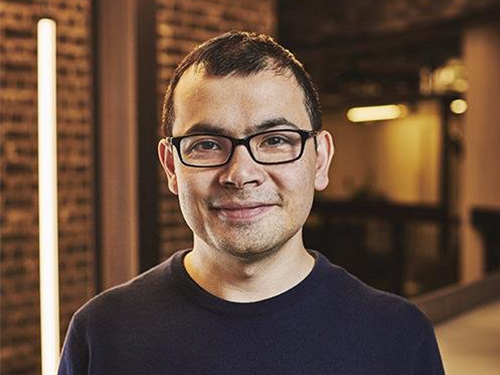 Dr. Demis Hassabis, the Developer of AlphaGo, Lectures at KAIST
AlphaGo, a computer program developed by Google DeepMind in London to play the traditional Chinese board game Go, had five matches against Se-Dol Lee, a professional Go player in Korea from March 8-15, 2016. AlphaGo won four out of the five games, a significant test result showcasing the advancement achieved in the field of general-purpose artificial intelligence (GAI), according to the company.
Dr. Demis Hassabis, the Chief Executive Officer of Google DeepMind, visited KAIST on March 11, 2016 and gave an hour-long talk to students and faculty. In the lecture, which was entitled “Artificial Intelligence and the Future,” he introduced an overview of GAI and some of its applications in Atari video games and Go.
He said that the ultimate goal of GAI was to become a useful tool to help society solve some of the biggest and most pressing problems facing humanity, from climate change to disease diagnosis.
2016.03.11 View 5058
Dr. Demis Hassabis, the Developer of AlphaGo, Lectures at KAIST
AlphaGo, a computer program developed by Google DeepMind in London to play the traditional Chinese board game Go, had five matches against Se-Dol Lee, a professional Go player in Korea from March 8-15, 2016. AlphaGo won four out of the five games, a significant test result showcasing the advancement achieved in the field of general-purpose artificial intelligence (GAI), according to the company.
Dr. Demis Hassabis, the Chief Executive Officer of Google DeepMind, visited KAIST on March 11, 2016 and gave an hour-long talk to students and faculty. In the lecture, which was entitled “Artificial Intelligence and the Future,” he introduced an overview of GAI and some of its applications in Atari video games and Go.
He said that the ultimate goal of GAI was to become a useful tool to help society solve some of the biggest and most pressing problems facing humanity, from climate change to disease diagnosis.
2016.03.11 View 5058 -
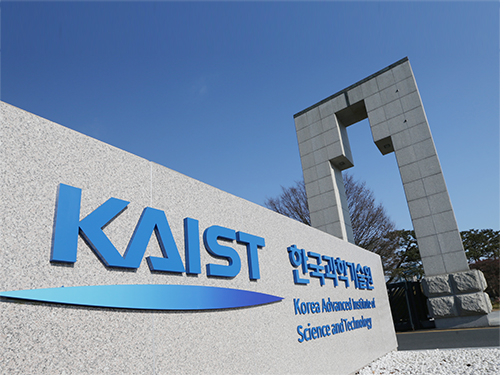 KAIST Ranks Third in the World's Top Universities for Attracting Industry Funding
The Times Higher Education released its World University Rankings online, naming the 20 best institutions that secured the largest amount of research funding from the private sector, on March 8, 2016.
The rankings were based on the 2013 record of industry-sector investments made per academic of an institution.
According to the list, KAIST ranked third with a figure of $254,700.
Germany’s Ludwig Maximilian University (Munich) took first place ($400,000), while the United State’s Duke University placed second ($290,000).
For a full list of the rankings, go to https://www.timeshighereducation.com/world-university-rankings/funding-for-innovation-ranking-2016.
2016.03.08 View 4061
KAIST Ranks Third in the World's Top Universities for Attracting Industry Funding
The Times Higher Education released its World University Rankings online, naming the 20 best institutions that secured the largest amount of research funding from the private sector, on March 8, 2016.
The rankings were based on the 2013 record of industry-sector investments made per academic of an institution.
According to the list, KAIST ranked third with a figure of $254,700.
Germany’s Ludwig Maximilian University (Munich) took first place ($400,000), while the United State’s Duke University placed second ($290,000).
For a full list of the rankings, go to https://www.timeshighereducation.com/world-university-rankings/funding-for-innovation-ranking-2016.
2016.03.08 View 4061